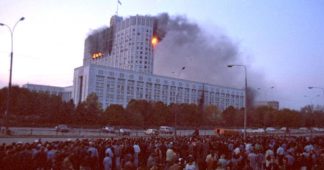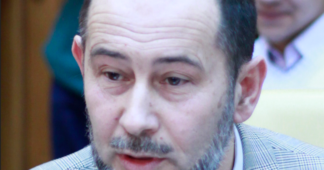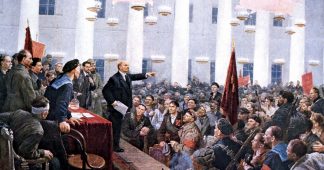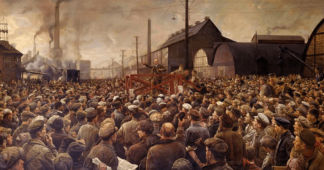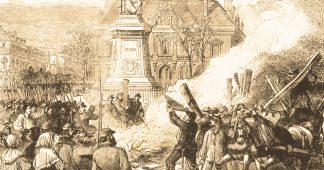IT IS NO surprise that the imminent 90th anniversary of the October Revolution in Russia has become the object of widespread attention. The events of October 1917 were, indeed, an earthquake that shook the world, altering its economic, social and cultural foundations.
Many media sources depict this world-historic phenomenon as a mere coup d’etat, carried out by a handful of conspirators and adventurists with the help of Western security services. All sorts of things are circulated — outright lies, distortion of the facts, and malicious slanders about the participants in and leaders of this mighty event.
Old fables that the “October coup” was provoked by the “German agent” Lenin and the “Anglo-American spy” Trotsky are still being repeated, despite having been rejected by distinguished scholars from various countries. Meanwhile, the Russian people are portrayed as unwitting toys in the hands of “revolutionary extremists,” even though the revolution could neither have begun nor triumphed without the population playing a decisive role.
Social Revolution, Not Conspiracy
The October Revolution was a social earthquake, a hurricane, a tsunami, which no one could ever have called forth by mere appeals. The revolution arose out of the internal logic of events, when a multitude of sources of popular discontent converged into a single, all-powerful stream. To interpret it as the product of a conspiracy is strange, to say the least. If this were true, how was a new governing authority set up in place of the old in a gigantic country and in a short time, and why did the Russian people not only support this government, but defend it with arms in hand during the Civil War?
For some reason, the critics of the “October coup” forget the profound crisis into which Russia had been plunged by the tsarist monarchy and the Provisional Government which succeeded it.
Mesmerized by the slogan “War until Final Victory!” the authorities refused to take account of the real needs of the people. Critics also forget the spontaneous disintegration of the monarchy on the eve of the revolution, despite the direct evidence in the form of the endless intrigues and conflicts within the tsar’s court, the military defeats at the front, and finally, the outright abdication of Nikolai II, the autocrat and commander-in-chief of the Russian army.
The bourgeois government that replaced the monarchy also proved impotent, failing to meet the great challenges of the time — stopping the war and giving land to the peasants.
October 1917 marked the culmination of the great Russian social revolution of the 20th century. It was led by revolutionary social democrats who, earlier than others, had recognized the needs and hopes of ordinary people — the pressing problems to which Russian society of the time required solutions.
Among the leaders, of course Lenin and his closest collaborators played the key roles. None of the leaders of the October revolution were flawless, but it is just as wrong to demonize as to idolize them.
The October Revolution is often termed a “violent overthrow.” Yet the actual “overthrow” in Petrograd occurred almost without human victims. While we are not advocates of violence, we recognize that it is inevitable at particular stages of historical development, when it is bound up with the presence of class and national antagonisms.
Revolution is indeed associated in many respects with violence, as was clearly evident, for example, in the bourgeois revolutions in the Netherlands, England, France and so forth. The ending of slavery in the United States was accompanied by the bloodiest conflict of the 19th century, the American Civil War. In Russia, the ending of feudalism was also accompanied by wars and revolutions.
These developments, were not called forth by the machinations of political intriguers, but by the crisis of the old system and by the impossibility of solving age-old problems by evolutionary methods. People resort to revolutionary violence in specific circumstances, when the ruling classes, blinded by thirst for their own enrichment and for the maintenance of their privileges, neglect the well-being of the people.
The dispossessed classes then have no choice except to take their fates in their own hands. This is the main lesson of the Russian Revolution for the 20th century.
What the October Revolution Yielded
The history of different countries has always included numerous struggles by workers against capitalism. Only in Russia, however, did these actions take on so far-reaching a character. This made 20th-century Russia the epicenter of world development, where all the main questions of the contemporary world intersected.
The revolution affirmed the soviets as the most democratic form of political power, granting the war-weary population the long-awaited peace and land, along with the opportunity for national self-determination. By raising millions of workers to the point where they could exercise social creativity, the revolution showed clearly that it is not only the “elites” that are capable of being the subject and moving force of history.
Soviet history included both great achievements and appalling tragedies. We know very well that after the peaceful transfer of power to the workers in most of the provinces of Russia, a bloody civil war began, accompanied by foreign intervention and by White and Red terror.
The Soviet authorities naturally made many mistakes. One particular error was the policy of “war communism,” a product of the general national crisis. To their credit, the Bolsheviks decisively rejected it, and made a deliberate shift to the New Economic Policy — the first historical model in which the principles of socialism and capitalism were successfully combined. Many features of NEP were later reproduced in the context of the development of several European countries and of modern China. NEP also allowed the wounds of war to be rapidly healed, and production in the Russian economy to be raised to its pre-war level.
Lenin worked out a plan for the further development of the Soviet state, a plan which included radical economic and political changes. These transformations were aimed above all at achieving breakthroughs in the development of energy generation, culture and education — areas that were decisive in the 20th century and which remain so in the 21st. These changes presupposed democratizing the political system through drawing workers into running the state, and through the renovation of the party.
Here, one of the moves which Lenin projected was removing Josef Stalin from the post of general secretary. Even then, Stalin was manifesting his traits of disloyalty, boorishness and the abuse of power.
These plans, however, were fated to go unrealized. While declaring socialism to be its goal, the authoritarian regime that consolidated itself after Lenin’s death did a great deal that was incompatible with socialism. The political liberties of citizens that had been proclaimed by the revolution were comprehensively violated. The price paid for industrialization and forced collectivization was exorbitant.
In sum, the popular power of the initial years of the revolution degenerated into rule by the bureaucracy and its leader Stalin. We consider the massive Stalinist repressions, along with the violation of the rights of the individual and of whole nationalities in the USSR, to have been a crime. All this discredited the ideals of the revolution and of socialism.
While acknowledging these facts, we do not accept scholarly sounding lies and stupefyingly one-sided propaganda with regard to the whole of Soviet history. This history was diverse; within it, democratic and bureaucratic tendencies engaged in conflict with and replaced one another.
Hence, the freedoms of the NEP years were replaced by Stalinist totalitarianism, which in turn gave way to the Khrushchev “thaw.” Later, the Brezhnev authoritarianism was replaced by perestroika, which proclaimed as its goal the creation of a humane, democratic socialism.
The history of every country is subject to argument and debate. The cruelties of the British and French colonial wars, and of slavery in the United States, were scarcely better than the Soviet gulag. However, this did not negate the social and cultural achievements of these countries.
Why the Soviet Model Collapsed
It should be noted that we have a range of views on the nature of the social system that existed in the USSR. We are agreed, however, that neglect or rejection of the principles of popular power, internationalism, justice and humanism that were born out of the October Revolution will sooner or later result in catastrophe for a society that is building socialism.
This is what happened in the Soviet Union. The fetters placed on the creative initiative of the people under the totalitarian regime dramatically restricted the opportunities for the growth of the Soviet economy. A shortage of consumer goods was one of its characteristic features. As a result, we did not manage to raise the level of well-being of the working people to that found in the world’s developed countries, and this served as one of the causes of the downfall of the Soviet system.
Another vital cause was the lack of real economic and political democracy, which became especially intolerable when a technological and information revolution was unfolding in the world. One of the consequences of this was the complete alienation of the bureaucratic authorities and the ruling party from the workers. The attempt to overcome this alienation during perestroika did not yield the required result.
In sum, the collapse of the USSR and of the Soviet government became a reality. This was seized upon by the political forces that dissolved the USSR and directed Russia along the road of installing a savage oligarchic capitalism, marked by mass joblessness, falling living standards for the population, profound social stratification, rampant nationalism and growing crime.
The failure of the Soviet model does not signify that the ideals of October were false. Just as the ideas of Christianity were not to blame for the practices of the Inquisition, Stalinist totalitarianism could not destroy the ideals of the revolution.
Socialism as a historic cause cannot be brought to realization all at once. A new generation of young people is now appearing, people who do not accept capitalism as a system. There is every reason to hope that this generation will be able to breathe new life into the ideals of the October Revolution.
Russia is capable of once again becoming a great power, whose adversaries will be forced to take it into account. But this will only happen if the country overcomes the poverty and deep social stratification of its population, qualitatively improves the lives of its citizens, broadens their social and democratic rights, and retains everything that is best from its historic past.
October proved that another, more just world is possible. A range of social and political forces, countries and peoples, are now striving for this new world. This is shown by a new wave of revolutionary transformations, manifesting itself with particular force in a number of countries of Latin America and Asia.
The October Revolution was and remains our fate, and we cannot reject this crucially important part of Russian history. Always and everywhere there have been mistakes, and the great revolutions of the past did not avoid them either. Nevertheless, the anniversaries of these revolutions are celebrated in all countries, including at the state level.
Only in Russia is this not the case. In Russia, the denigration of the country’s revolutionary past continues. On the eve of the 90th anniversary of the October Revolution, we raise our voices against this practice. The people must have their revolutionary holiday and the truth about October returned to them. It must not be forgotten that we belong to a country whose history includes its own great revolution. We can and should be proud of it.
Arslanov V., Dr. of Art, professor, Russian Academy of Education; Bagaturiya G., Dr. of Philosophy, professor, Lomonosov Moscow State University; Buzgalin A., Dr. of Economics, professor, Lomonosov Moscow State University; Dzarasov S., Dr. of Economics, Russian Academy of Science; Galkin A., Dr. of history, professor, Russian Academy of Science; Istyagin L., Dr. of history, Russian Academy of Science; Kelle V., Dr. of Philosophy, Russian Academy of Science; Kolganov A., Dr. of Economics, Lomonosov Moscow State University; Loginov V., Dr. of History, professor, Russian Academy of Education; Medvedev R., Dr. of History; Rudyk E., Dr. of Economics, Russian Academy of Labor; Serebrykova Z., Dr. of History; Shatrov M., writer; Slavin B., Dr. of Philosophy, professor, Moscow State Pedagogical University; Smolin O., Dr. of Philosophy, professor, MP; Voeikov M., Dr. of Economics, Russian Academy of Science; Vorobiev A., academician, Russian Academy of Science.
We remind our readers that publication of articles on our site does not mean that we agree with what is written. Our policy is to publish anything which we consider of interest, so as to assist our readers in forming their opinions. Sometimes we even publish articles with which we totally disagree, since we believe it is important for our readers to be informed on as wide a spectrum of views as possible.
